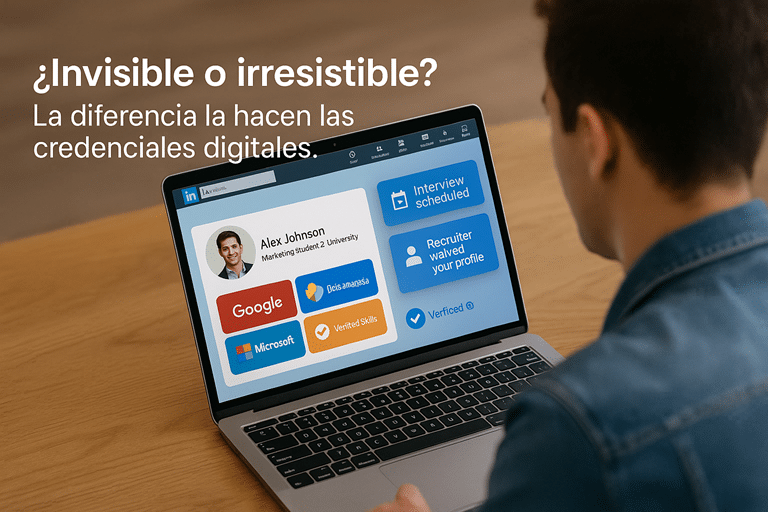At present, digital credentials They have become a valuable tool for recognizing achievements and skills in a visual and accessible way. These credentials, which are digital representations of skills or achievements, offer significant benefits to both individuals and organizations. In this article we will tell you about digital credentials and their main use cases, both in the educational and professional fields.
Credentials are based on open standards and can be easily shared and verified in digital environments. As organizations and individuals recognize the value of competencies acquired outside of traditional contexts, digital credentials have become more popular. In this article, we will explore the most common use cases for digital credentials and how they are transforming different sectors. In reality, there are thousands of examples of use, however we are going to review the ten most notable ones.
1.Certifications and courses
Digital credentials are widely used in online courses and certification programs. By awarding a digital badge to students who successfully complete a course or program, you provide them with a tangible way to demonstrate their acquired skills and knowledge. These credentials can be easily shared on professional platforms and social networks, helping students stand out from the crowd and catch the attention of potential employers.

2.Job skills
In work environments, digital credentials can be used to recognize and reward specific employee competencies. For example, an organization may award a digital badge to an employee for her or his skill in leadership, teamwork, or problem solving. These credentials not only recognize individual achievements, but also foster an environment of continuous learning and professional development.

3.Events and conferences
Digital badges are also used at events and conferences to reward attendee participation and engagement. For example, conference organizers can award digital credentials to those who attended all sessions or actively participated in discussions. These credentials act as digital souvenirs and help participants demonstrate the experiences and knowledge gained from participating in relevant events.

4.Technical skills
In the IT and technology space, digital credentials have become a popular way to certify and demonstrate technical skills. For example, platforms like Cisco and Microsoft issue digital credentials to those who have demonstrated proficiency in areas such as network administration or programming. These credentials allow professionals to highlight their specialized knowledge and improve their career opportunities.

It might interest you: Why hire Acreditta instead of building your own development
5.Volunteering and community service
Digital credentials can also be used to recognize and value volunteer work and community service. Nonprofit organizations can award digital credentials to volunteers who have made a significant impact in their communities. These credentials not only recognize volunteers’ effort and dedication, but can also help them establish connections with other organizations and volunteer opportunities.

6.Academic achievements
In the academic field, digital credentials can complement or replace traditional certificates and diplomas. Educational institutions can award digital credentials to students who have achieved outstanding results in specific areas, such as mathematics, science or arts. These credentials provide a more visual and tangible way to display academic achievements and can be easily shared on online platforms and professional profiles.

7.Professional recognition
Digital credentials are also used to recognize and highlight professional achievements in different fields. For example, a professional association may award a digital badge to an individual for outstanding contributions to the industry or leadership in a specific area. These credentials help establish a professional’s reputation and credibility, as well as provide them with the opportunity to connect with other experts in their field.

8.Personal development
Digital credentials can be used in the field of personal development and individual growth. For example, a person who has completed a personal challenge or achieved an important goal can earn a digital badge as a form of personal recognition and motivation. These credentials act as tangible reminders of achievements and can be a source of inspiration for future challenges.

9.Boot camps
In agile learning and development environments, digital credentials are used as a form of gamification to motivate students and encourage their active participation. By awarding digital badges for completing tasks, reaching milestones, or overcoming challenges, you create a reward system that boosts student motivation and engagement. These credentials can also unlock additional content or special privileges within an educational platform.

10.Team Membership
Organizations can grant credentials to their collaborators for being part of the organization, with the aim of consolidating their sense of belonging and uniting the entire team. In addition, this type of recognition generates engagement with the collaborator when he shares his achievement on networks, which strengthens the company’s brand and reputation in the digital field. In addition, credentials can also be granted for being part of a project, for performance, for seniority and more.
Digital credentials and their key use cases, both educational and professional, offer a visual and tangible way to highlight and validate individual achievements. Additionally, by being easily shared online, they allow people to strengthen their personal brand and create valuable connections. So don’t hesitate to explore the opportunities that digital credentials can bring to your organization and community!








